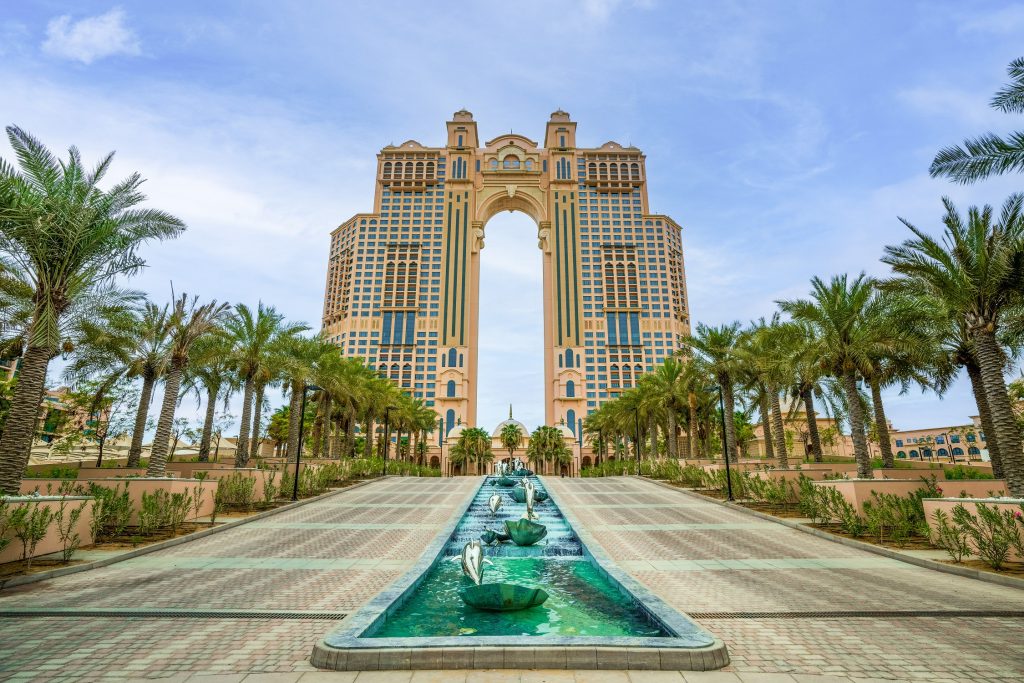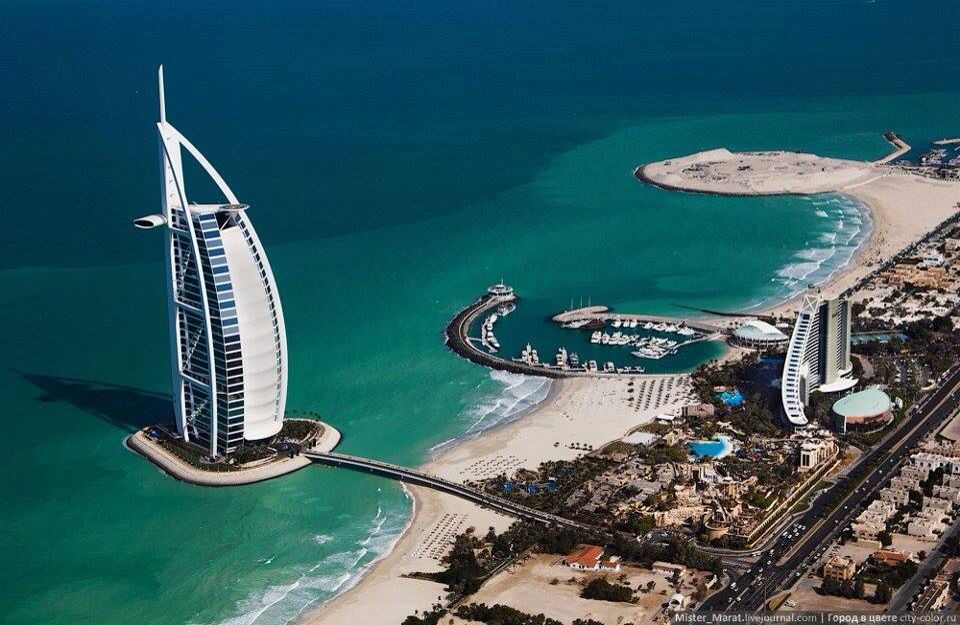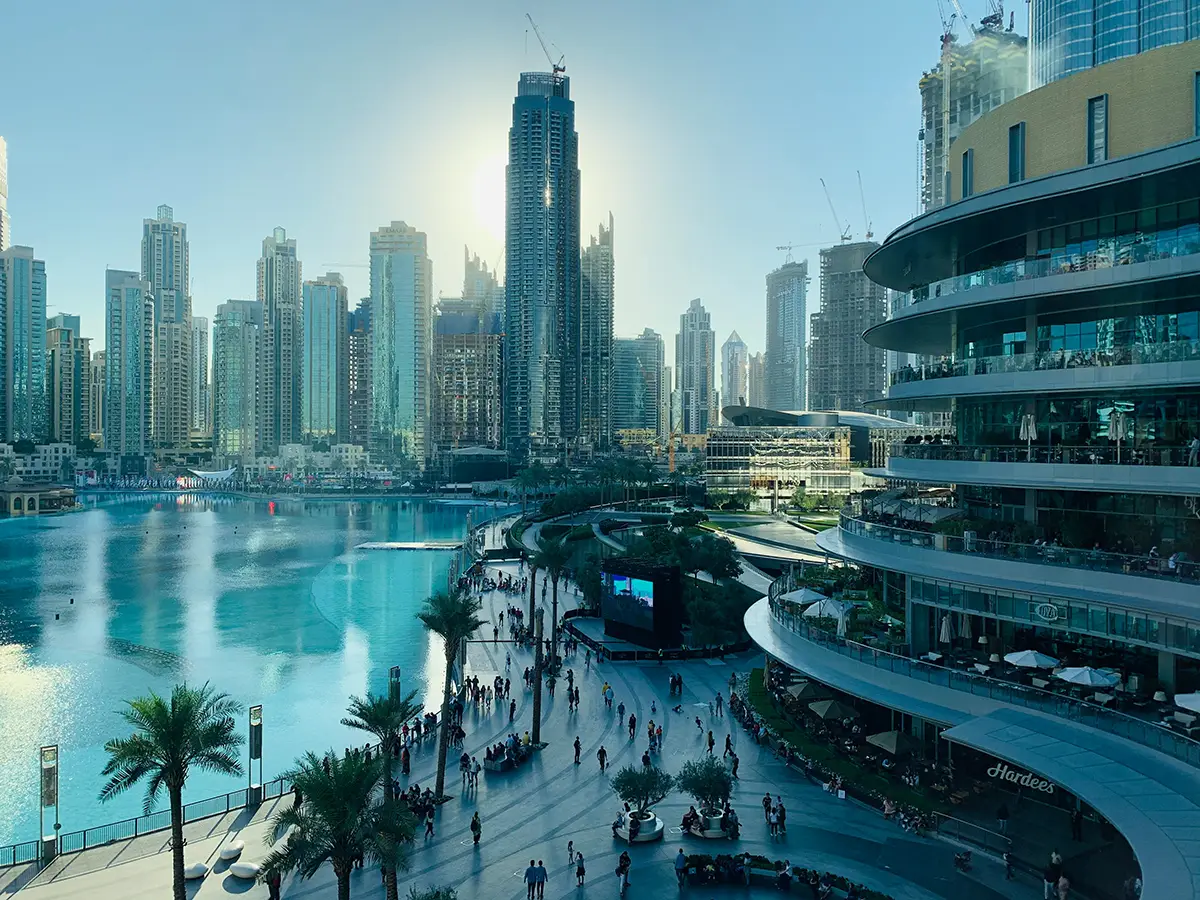The Gulf state is not a monolith, but six flavours of the same dish and a seventh with its own recipe. One emirate builds cities, another builds silence. The choice is not a tourist quest but a strategic decision. The question of which emirate of the UAE is better to live in is not about beaches, but about the balance between income and rhythm, prices and comfort.
Dubai: a city for those who don’t slow down
Dubai doesn’t suggest – it dictates. It accepts the challenge, not reasoning. The city grew out of the desert like a start-up on steroids: skyscrapers, driverless transport, beaches like a picture from a cream advert.
Life in Dubai obeys the principle of “expensive but worth it”. The average rental rate for a one-bedroom in the centre is AED 7,000-9,000 per month. The Downtown, Marina, JVC districts are holding up demand, and office rentals in Business Bay have increased by 18% over the year. The UAE property market shows the most activity here.

For foreign professionals, the UAE is first and foremost Dubai. Microsoft, Amazon, Oracle corporations base their MENA offices here. The city attracts IT, marketing and architecture specialists. Moving to the country is most often due to work and business.
In which emirate of the UAE it is better to live for career growth and maximum access to infrastructure – Dubai gives the most obvious answer.
Abu Dhabi: less noise, more sense
 Abu Dhabi is an equally powerful player, but a quieter speaker. If Dubai is the glossy cover, Abu Dhabi is the corporate report: serious, steady, reliable. Average income per capita is higher, infrastructure less chaotic.
Abu Dhabi is an equally powerful player, but a quieter speaker. If Dubai is the glossy cover, Abu Dhabi is the corporate report: serious, steady, reliable. Average income per capita is higher, infrastructure less chaotic.
Moving to the UAE with a family more often involves choosing the capital. Here are large schools, universities, hospitals with JCI-accreditation. In which emirate of the UAE is better to live for a quiet but prosperous life – Abu Dhabi confidently offers arguments.
Rental prices are 15-20% lower than in Dubai, while the quality of housing is often higher. Khalifa City and Al Reem Island remain top locations. And the labour market is concentrated around energy, public sector, medicine and education.
Sharjah: quieter you drive, longer you pay.
Sharjah remains a compromise. The rent is 1.5-2 times lower than in Dubai, but the office is an hour away by road. But taxes are still zero. In what region of the UAE is better to live with a limited budget, but close to the metropolis – Sharjah often wins on the price/location ratio.
The city is actively developing: new neighbourhoods like Aljada offer business class housing, but without the Dubai mark-up. Property prices: from AED 500,000 for a studio in a new building. The cost of living remains the most affordable in the central part of the country.
Ras Al Khaimah: investing in the horizon
Which UAE emirate is best to live in with an eye on the future – investors are increasingly pointing to Ras Al Khaimah. The region has built its business model on long-term attractiveness. Industry, hotels and ports are being developed here.
The UAE property market offers the most favourable conditions for investors here: taxation is minimal, land costs are low, and there is little competition. The segment of resort life attracts those who seek silence and nature. The Hajar Mountains are within an hour’s drive.
Expat life in this emirate is still limited. But a community of Europeans and Russian-speaking professionals has already formed. Another point has been added to the cities for relocation, which is steadily growing.
Fujairah: Back East
Fujairah, the only emirate on the Gulf of Oman, plays a special role. The port, the mountains, the strategic logistics. Life here is like no other. Reviews note tranquillity, stability and low costs.
Real estate: from 300,000 dirhams for one-bedroom flats in residential complexes near the coast. The cost of living is half that of Dubai, but the number of career and leisure options is minimal. Which UAE emirate is best to live in for remote work or retirement – Fujairah wins out over the rest.
What is important to consider when choosing an emirate
To choose which UAE emirate is best to live in, you need to compare key parameters.
A list to help you compare:
- Cost of living: from $1,500 in Sharjah to $3,500 in Dubai (per person with rent).
- Work opportunities: maximum in Dubai and Abu Dhabi; minimum in Fujairah.
- Developed neighbourhoods: premium in Dubai Hills and Saadiyat Island; middle class in Al Majaz (Sharjah).
- Taxes: business income tax – from 2023 9% (on revenue of AED 375,000 or more), no personal income tax in all regions.
- Housing market: from AED 3,000 for a studio in Sharjah to AED 12,000 in Dubai (per month).
- Infrastructure: best in Abu Dhabi and Dubai, average in Sharjah, limited in Fujairah.
- Feedback: maximum satisfaction with comfort and safety – in Abu Dhabi; speed of life – in Dubai.
Choosing a particular emirate depends directly on your priorities – whether it’s your career, level of spending or the pursuit of a relaxed life. Each region in the country offers a special combination of conditions, creating a different style of everyday life.
How life is changing for expats in the UAE
Expat life in the UAE doesn’t look the same in every region. The differences are not only in prices and climate, but also in mentality, infrastructure and access to services. Which emirate is better to live in for a comfortable adaptation depends on expectations and habits.
Dubai provides the maximum multicultural environment. There are British, American and Indian schools, dozens of language centres, and a variety of leisure activities. Annual population growth at the expense of foreigners is about 4%. The level of comfort is comparable with Toronto and Singapore.
In Abu Dhabi, it is easier to integrate into the professional environment: many companies themselves accompany expats, issue residence permits, and rent accommodation for a year in advance.
Sharjah offers a quiet religious environment – alcohol is prohibited, nightlife is absent, but education is 30 per cent cheaper.
UAE cities to relocate to: who’s winning
Which UAE emirate is best to live in for specific tasks reflects not only the capital and metropolis. Different cities form their own advantages.
- Al Ain (Abu Dhabi) – optimal for families with children, developed medical services, schools with rating above average.
- Ajman – housing is cheaper than Sharjah, but infrastructure is inferior, which affects convenience.
- Dibba (Fujairah) – interesting for remoters and nature lovers, the climate is milder, seasonal congestion is minimal.
Reviews confirm: with the right strategy, moving to the Emirates leads to an increase in income, comfort level and lower tax burden.
Where it is more profitable to own and rent
The country’s property market has become the core of the economy, with construction and housing transactions accounting for more than 30% of GDP. Dubai is leading the way: 2024 brought price growth of 17% in the premium sector and 11% in the average. Which UAE emirate is best to live in if the goal is to invest in property, Dubai still offers the best liquid properties.

Abu Dhabi is inferior in dynamics, but compensates with reliability: less price fluctuations, more long-term tenants.
Sharjah and Ras al-Khaimah are developing separate residential clusters, where investments per square metre are 25-30% cheaper, but payback periods are longer.
From 2023 there is a flat tax for companies with profits from AED 375,000 – 9%, individuals are not taxed. VAT remains at 5% nationwide. This tax climate attracts businessmen and investors who are ready to combine the comfort of living with commercial benefits.
Which UAE emirate is the best to live in: conclusions
 Which UAE emirate is best to live in depends on your goals. Dubai will suit those who are building a career and are ready to pay for the pace. Abu Dhabi is the choice for stable decisions. Sharjah will balance budget and quality. Ras al-Khaimah is a springboard for investment. Fujairah is a rare example of seclusion.
Which UAE emirate is best to live in depends on your goals. Dubai will suit those who are building a career and are ready to pay for the pace. Abu Dhabi is the choice for stable decisions. Sharjah will balance budget and quality. Ras al-Khaimah is a springboard for investment. Fujairah is a rare example of seclusion.
 en
en  de
de  ar
ar  es
es  hi
hi  fr
fr  nl
nl  it
it  pt
pt  el
el 









